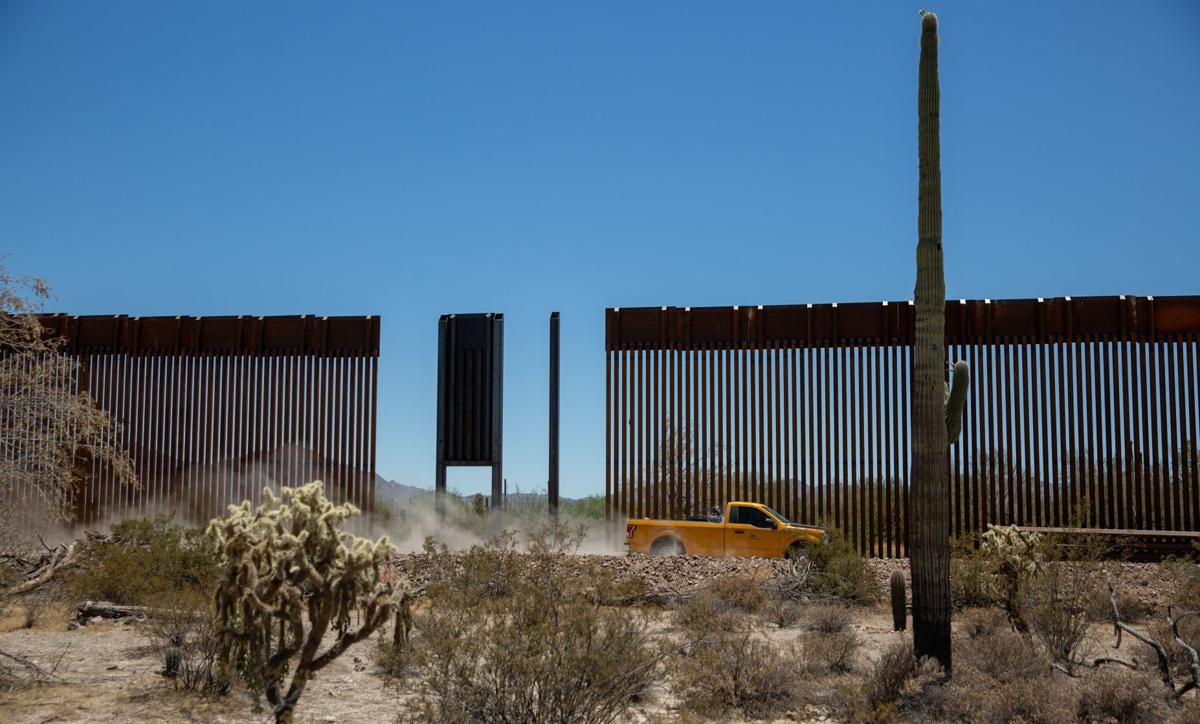PHOENIX — Claims by state Attorney General Mark Brnovich that the Biden administration is altering federal immigration law as part of “population augmentation strategies” is “a figment of the state’s imagination,” according to the U.S. Department of Justice.
Tyler Alexander, a trial attorney with the agency’s natural resources section, told Judge Dominic Lanza there are a host of reasons why Arizona cannot sue over the decision by the Biden administration to halt further wall construction, including unfinished projects in the state. He said these policy decisions are beyond the reach of the courts.
But Alexander reserved his harshest criticism to contentions by Brnovich that the decisions are part of an “overarching program of encouraging migration and augmentation of the U.S. population, labeled by Brnovich as “population augmentation policies.” He said that is a “program of the state’s own invention.”
“There is no ‘population augmentation program,’” he wrote.
In filing suit earlier this year, Brnovich seeks to use federal environmental laws to force the Biden administration to resume construction of the border wall.
That’s all based on the National Environmental Policy Act. It requires the federal government to determine the effects of any change in federal policy.
Brnovich contends these changes have not just an immediate impact, such as more trash left by migrants in the desert, but will mean more people in the state and the country which is bound to affect the environment.
That, he said, is all part of Biden’s population augmentation program. So is the decision by Biden to scrap the “remain in Mexico” policy of the Trump administration for handling asylum requests.
“Cumulatively, the population augmentation programs will likely increase the population of the United States by hundreds of thousands — if not millions — of people, with a disproportionate share of the increased burdens occurring in Arizona,” Brnovich contends.
Alexander told Lanza there are a series of problems with all that.
“Arizona has not shown a connection between the so-called population augmentation programs and its alleged harms,” he wrote.
Alexander said the state needs to show “a concrete, particularized and actual or imminent harm” that is traceable to the decisions of the Biden administration. Instead, he said, Brnovich is offering “generic and speculative affidavits.”
Without that proof of harm, Alexander said, Lanza cannot issue the injunction sought by the state.
And there’s something else.
Alexander pointed out that the Illegal Immigration Reform and Immigrant Responsibility Act, approved by Congress in 1996, specifically gives the government the power to waive environmental statutes and regulations if the director of the Department of Homeland Security determines it is necessary to complete security projects.
In fact, the Trump administration used that power to fast-track some border construction projects. And that decision was upheld by a federal appeals court.
“These waivers cover all aspects of construction, including the decision to halt construction,” Alexander said. And he told Lanza that 1996 law “divests this court of jurisdiction to hold otherwise.”
“Nor can Arizona prevail on its attempt to compel NEPA analysis for a population program of the state’s own invention,” Alexander wrote.
There are other flaws, the government argues.
For example, Alexander said that Brnovich argues that failing to finish the wall can harm wildlife by forcing them to alter their migration patterns into a narrow corridor where they “will be forced to ‘run the gauntlet of predators.’”
He said that ignores the obvious: Canceling the construction actually retains existing migration corridors.
There appears to be settled case law on the ability of government to proceed as it wants on border wall construction.
Environmental groups had tried to stop construction of the wall when it was first proposed, going all the way to the U.S. Supreme Court.
They acknowledged that 1996 law allowing waivers. But they argued that the law was unconstitutional because it gave too much power to the Department of Homeland Security to get around things like NEPA.
But the justices upheld lower court decisions permitting construction to continue.
The attorney general, however, says his case is different, with the halting of wall construction and scrapping of the “Remain in Mexico” program bringing “more and more people” into the country which “has a more and more devastating impact on our environment.”
Brnovich, who is running for U.S. Senate, has had little luck with other legal fights with the Biden administration over border policies.
Earlier this year, a different federal judge rebuffed his bid for an injunction prohibiting the federal government from enforcing its temporary pause on deportations.
And a federal appeals court rejected his bid to intervene in another case so he could defend a Trump-era rule designed to deny “green cards’’ granting permanent immigrant status to those at the bottom of the economic ladder.
More recently, he filed suit contesting the decision by the Biden administration to have the Occupational Safety and Health Administration promulgate an emergency rule to require that employees in companies with more than 100 workers be either vaccinated against COVID or submit to testing at least weekly.
But Brnovich is not challenging the authority of the president or OSHA to issue the rule. Instead he is making it about illegal immigration, contending it is unconstitutional to impose the requirement on legal U.S. citizens when there is not a similar mandate on those crossing the border illegally.
He also fought — and lost — a separate battle asking a federal judge to void provisions in a COVID-19 relief package that preclude any of the aid to the state from being used for tax cuts.





